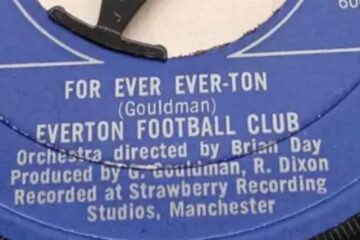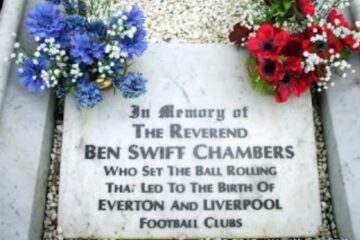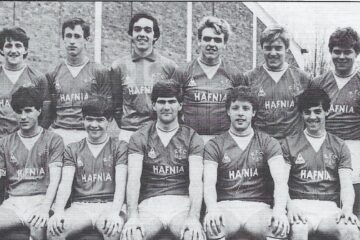Only Once a Blue
(Part 1)
Robert Jamieson
Hailing from the famous football nursery in The Vale of Leven, Robert Jamieson was to learn the rudiments of the association game surrounded by what were, at the time, some of the finest players in the kingdom. He was born on 7 September 1867 at 199 High Street, Dumbarton, the child of Robert, a journeyman fitter, and his wife Elizabeth. The head of the household was away on the day of the 1871 census, but Elizabeth was recorded, along with her four children, as living at 6 Clyde Street in Dumbarton. On the completion of his education, Rob Jamieson followed his father into the engineering trade, and started playing at junior level before signing for Dumbarton in the summer of 1886.
He was in the side which reached the Scottish Cup Final after beating Queens Park 2-1 at Hampden Park, and was selected at left wing when Dumbarton returned to the same venue to face Hibernian on 12 February 1887. It was the Edinburgh club, however, who carried off the trophy with a 2-1 victory.
Rob Jamieson, meanwhile, continued to impress on the football field and, on 19 October 1887, he made his first appearance in Liverpool when he played for Dunbartonshire against a side selected to represent Lancashire. It was the first appearance made by the county side at Anfield and, despite an increased admission fee, the officials were reported to be delighted with the attendance of around 8,000 people.
The home side were captained by Nick Ross of Preston North End, who was accompanied by fellow team mate, John Goodall. Herbie Arthur, the Blackburn Rovers and England goalkeeper, was also in the side, along with George Farmer of Everton and Davie Waugh of Burnley. (Both Ross and Waugh would later sign for Everton, while Bob Kelso and Alex Latta, who featured in the visiting team, would do the same.)
The star-studded Scottish side proved to have too much ‘know-how’ for the red rose county side and beat them 4-1. Rob Jamieson, who gave a man-of-the-match performance, scored a hat-trick as Lancashire suffered their first defeat in three seasons. Acting as umpire that day was the secretary of Bootle Football Club, Glaswegian Robert Sloan. It is quite possible that, with the assistance his Dumbarton-born captain Tom Veitch, he persuaded their fellow countryman to sign for the Hawthorne Road club when he had completed his apprenticeship.

Renfrewshire v Liverpool and District, 20 Oct 1888 – Robert Jamieson spearheads the attack for Liverpool and District.
(The Everton Collection)
Athletic News – Tuesday 23 October 1888
By the Loiterer
The annual fixture between Liverpool and District and Renfrewshire was a good thing for the Association, with Bootle and Everton both out of the way, but the gate scarcely reached the average of an Everton club game for all that. The Renfrewshire Association has had a very successful career, and has always been too good for Liverpool and District in the past. They came down at last, and at a somewhat unexpected time, for the District team was not so representative of the strength of Liverpool football as other elevens were, which, however, proved unequal to the task of taking down the Scotchmen. Bootle supplied the main strength of the side, and Earlestown three very valuable members, whilst the eleven was completed with a representative from Chester, one from Stanley, and one from Bootle Wanderers. The whole of the originally selected team turned up, and only a couple of changes took place in the side picked to represent the Scotch shire. The way the Liverpool lot went oft was a bit of a surprise to the onlookers, the forwards working together admirably. The visitors received great encouragement from the spectators, for be it remembered that the Liverpool Association is not in favour at Anfield Road. But for a Scotch team the forwards were a little bit clumsy, and not at all up to the Liverpool level. Fleming led off the scoring with a capital goal for Liverpool, and this was closely followed by a second front J. Shaw’s foot, whilst the Chester representative got a third almost immediately, to the evident surprise of the spectators and consternation of the visitors. The game seemed as if it would degenerate into a complete rout, so effectively did the Liverpool team combine. But after the third goal came a lull in the excitement; and up to half time play was somewhat open and not too interesting. For the rest of the game there was much that was pleasing in the play, and Renfrewshire made a very gallant effort to avert the impending defeat. The home defence was very stubborn, and Champion was the best of the lot, and very bad to beat. Munro did the trick, however, but Liverpool bestirred themselves, and a grand bit of play by Jameson, first with .J. Shaw and then with Fleming, enabled the last-named to get a fourth goal. From this point the visitors did most of the pressing, but by a very big slice of luck only managed to get their second goal just before the whistle of the referee called for a cessation of the play. Immense credit is due to the winners, who all played a good game, and Veitch, who captained the eleven, did not conceal his satisfaction, being very hilarious about the success of his men. The players, however, complain of the somewhat inadequate arrangements of the committee for their comfort in the dressing-room, and a general want of attention to their convenience. For the visitors it can be said that they were beaten past all hope of retrievement before they warmed to their work, but they afterwards tried to amend the situation by putting forth all their efforts. Their goalkeeper was weak, Dowling was the better of the two backs, Johnstone the only exceptional half, and the left wing the only strong point of their forward play.
Robert Jamieson duly arrived on Merseyside in December 1888, and was found employment at the Fulton Engine Works, owned by David Rollo & Sons, together with lodgings at 165 Bedford Road in Bootle. He first appeared before local fans at Anfield on Boxing Day, when he took part in a 0-0 draw against Everton. The Scot, who was later made the Bootle club captain, got on the scoresheet when the two sides met in the return game at Hawthorne Road which ended in a 3-3 draw.
Jamieson captained his new club in the final of the Liverpool Senior Cup, on 23 March when they faced Earlestown before a crowd of 5,000 people, on the enclosed home of the Stanley club at Walton Stiles. The men from the ‘wagon town’ led 3-1, but a late rally from Bootle, in which Jamieson scored twice, saw them lift the trophy with a 5-3 victory. Nevertheless, local bragging rights had yet to be settled, and Bootle and Everton met for a third time, before a full house at Anfield, on 15 April 1889.
The game had been underway for only two minutes when Rob Jamieson put the visitors ahead from a free kick. The Football League side were soon stirred into action and laid siege to the Bootle goal for the rest of the game, finally drawing level towards the closing stages of the contest. In a tragic twist for Everton, and against the run of play, Bootle scored the winning goal with almost the last kick of the game to seal a famous victory. In the euphoria following the final whistle, the Athletic News reported that ‘…the visiting fans invaded the field and carried their captain shoulder high out of the enclosure.’
However, this would be the last time that the old Bootle club would beat their wealthy neighbours, who now brought in top quality players from Scotland such as Brady, Doyle, Hannah and Latta, along with Millward from Great Marlow. Bootle, meanwhile, became founder members of the Football Alliance.
The 1889-90 season began well for Bootle, and they were contesting the league leadership with Sheffield Wednesday by the time they visited the North Road home of Newton Heath in Manchester on 7 December 1889. The Railwaymen had been decisively beaten at Hawthorne Road in the preceding fixture, and they were anxious to redress the balance. Mr Sam Ormerod of Accrington was the man in the middle, but he failed to prevent the game from disintegrating in to a bad-tempered and most disagreeable affair. Indeed, some of his decisions so angered Rob Jamieson that he ordered his players to leave the ground and make their way back to the headquarters of the home club on Oldham Road. The Bootle officials however, quickly intervened and pleaded with their captain to consider the penalties that could be imposed by the Alliance committee should they fail to complete the fixture. After much deliberation, the Scot finally reversed his decision and ordered his players back into the enclosure. Nevertheless, the game still ended in a 3-0 win for Newton Heath.
At the end of that season, Rob Jamieson made his one and only Football League appearance for Everton. On the 15 March 1890, the FA committee had arranged two England fixtures on the same day against both Ireland and Wales. Everton’s Jonny Holt was selected to play at Wrexham against the Welsh, while his teammate Fred Geary would lead the forward line against the Irish in Belfast.
Their selection for the national side, combined with injuries to other players, left a weakened Everton side, and the club executive were granted permission for Rob Jamieson to replace Geary at centre-forward for the final game of the season against Derby County at home.
The match report summarised his efforts,
‘The home forwards did not connect nicely, the wings were clever, particularly on the left, but they did not understand the style of play by Jamieson, nor did the Bootle captain seem to grasp the ideas of the wing men. Altogether Jamieson was not a success, but he tried hard to please by passing to the sides.’
Liverpool Courier, 17 March 1890
Despite these misunderstandings, the Scot helped Everton to win the game 3-0, and returned to a Bootle side that were to finish second in the Football Alliance behind Sheffield Wednesday. During that 1889-90 season, Rob Jamieson had represented the Liverpool & District FA on several occasions and had also been selected to represent Lancashire. Yet the following season, in a remarkable reversal of fortune, the Yorkshire side finished bottom of the table with Bootle just one place above them.
Consequently, the Bootle committee decided to remove Jamieson as club captain in preparation for the 1891-92 season. But in response, according to the Bootle Times, he informed them that ‘he had settled for life in the Merchant Navy and would only be available for selection when shore leave permitted.’
The committee decision did not go down well with the Hawthorne Road faithful and letters of protest appeared in the local newspapers complaining of the manner in which such a loyal servant had been treated by the executive. However, they had to wait until 14 October before he reappeared in the Bootle side, helping them to a 4-1 win over Grimsby Town.
That evening a banquet was held at the Victoria Hotel and Rob Jamieson, who was guest of honour, sat beside the club chairman, who later presented him with a gold Albert chain and a pendant on which was inscribed:
To Robert Jamieson from his friends at Bootle
The Scot remained ashore and was in the side which faced Everton on 20 February, in a Lancashire Cup tie at Anfield, before a crowd of 8,000 fans. The Football League side proved too strong for their Alliance neighbours and beat them 3-0. Robert Jamieson made his final competitive appearance for Bootle on 12 March, getting his name on the scoresheet in a 6-1 drubbing of Grimsby Town.
When his football career came to an end, Rob Jamieson concentrated on his new life in the Merchant Navy, while making a permanent home on shore on Merseyside. In 1898, he married Mary Campbell, the sister of former Everton player Wattie Campbell, at Bootle Registry Office.
By 1901, with the new addition of one-year old son Robert, the Jamieson family were living with Mary’s parents at 7 Exeter Road in Bootle. They went on to have another two children before Rob Jamieson died rather suddenly following a short illness aged only forty-one in April 1908, and was buried in Anfield Cemetery.
Tony Onslow



